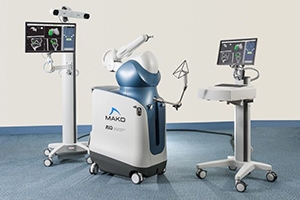Acute and chronic hip pain can occur for various reasons, and often go undetected until they bring about more severe issues. From injuries to deterioration of the soft tissues that surround the hip, it's essential to know what the causes are behind hip pain and which treatment options to seek if you are suffering from this condition.
Depending on the cause, you may be experiencing mild discomfort to severe pain. Often, this pain does not go away on its own. It’s important to know when to seek treatment for hip pain.
So, what should you do if you find yourself suffering from hip pain? We’ll delve into the options and cover what measures to take for these common hip issues.
You may have questions such as, how is a dislocated hip treated? Or, maybe you want to know what you should do for more chronic conditions like tendinitis. First, let’s take a look at the symptoms of hip pain.
Symptoms of Hip Pain
Hip pain is not limited to that area of the body. You may experience other symptoms aside from the obvious pain of the affected area. You may also experience pain or discomfort in your:
· Groin
· Internal hip joint
· External hip joint
· Thigh
· Buttocks
5 Most Common Causes of Hip Pain
The most common causes of hip pain occur as a result of these hip conditions (including but not limited to the following):
· Dysplasia
· Bursitis
· Arthritis
· IT band syndrome
· Piriformis syndrome
· Avascular necrosis
Outside of acute or chronic medical conditions, there are other injuries or physical conditions that may cause hip pain. Here are a few of the most common causes and what you should do if you suspect you suffer from these conditions.
1. Hip Dislocation
A common injury to the hip area is known as hip dislocation. This can come about when the ball of the femur bone (thigh bone) detaches from the pelvic bone. How is a dislocated hip treated? Hip dislocation treatment will ultimately depend on the age of the patient.
For younger patients who sustained injury from either playing a sport or any other physical activity, treatment will include pain relief medications, rest, and physical therapy (if severe).
Dislocated hip treatment for elderly patients may require more advanced treatment options. Along with pain relievers and rest, elderly patients may also require the following treatments:
· Non-surgical reduction (a physical realignment) by manipulation
· Orthopedic surgery
· Compression therapy
2. Hip Fracture
As you age, bones become more brittle. As a result, slips and falls (even minor ones) can lead to a hip fracture. The fracture can occur on the pelvic bone where the femur attaches to the hip joint, or it can occur on the femoral head (the ball at the top of the thigh bone).
Treatment for a hip fracture almost always requires surgery. Casting can help minor breaks. However, most hip fractures do require some type of surgery.
If you slip and fall and experience hip pain, contact your primary care physician to see whether they think you should go to the Emergency Room for care. If the pain is severe or immobility is an issue, you should seek medical care immediately.
3. Soft Tissue Tears
The soft tissue surrounding the tendons, ligaments, and muscles that connect the hip bones can incur injury, just like any other body joint. Some of these tears can lead to chronic hip pain that will require long-term treatment and pain management.
These tears include (but are not limited to):
4. Tendinitis Syndrome
Among the common causes of hip pain, along with bursitis and arthritis, you may also suffer from inflammation of the tendons that attach the muscles to the bones leading to the condition known as Tendinitis. You can injure these thick bands of tissue by applying repetitive stress on them as a result of overuse.
If you suspect Tendinitis, it’s advisable to contact your health care provider to confirm the diagnosis and seek the most appropriate treatment method. Common forms of treatment include:
· NSAID pain relievers
· Corticosteroid injections
· Platelet-rich plasma (PRP) injections
· Physical therapy
· Possible surgery (if severe)
There are also some home remedies you can try. These include rest, ice packs, compression, and elevation.
5. Certain Cancers
In more extreme cases, bone cancers can cause hip pain if the tumor is in the hip bones or has metastasized (spread from the initial affected area) into the hip joint. Bone cancer treatment will involve chemotherapy and radiation therapies for cancer and surgery to remove the tumor.
Seek Treatment for Hip Pain with The American Hip Institute
It can be challenging to know when to seek treatment for hip pain, especially if your symptoms are mild. However, some injuries simply won’t heal on their own. For example, for dislocated hip treatment elderly patients require the expertise of medical professionals.
At the American Hip Institute, we work with patients of all ages. From sports injuries in young people to trip and fall hip injuries in the elderly, we offer pain-relieving treatments to alleviate your discomfort and get your hips back in optimal health. Whatever your hip condition is, we can help.
If you or a loved one is suffering from acute or chronic hip pain, seeking treatment will put you at ease and help relieve this discomfort. Contact us here to schedule a consultation with one of our medical professionals.




